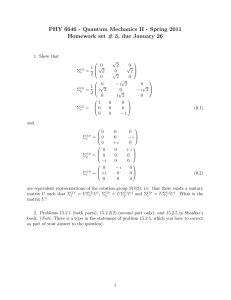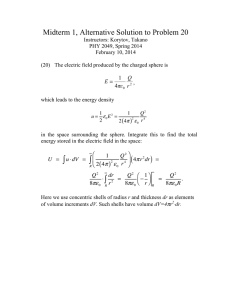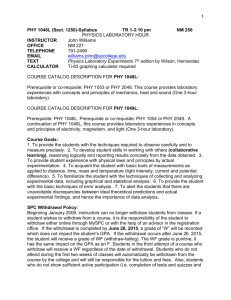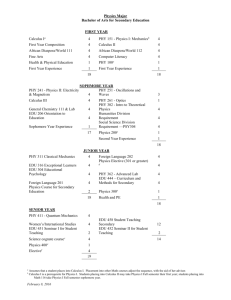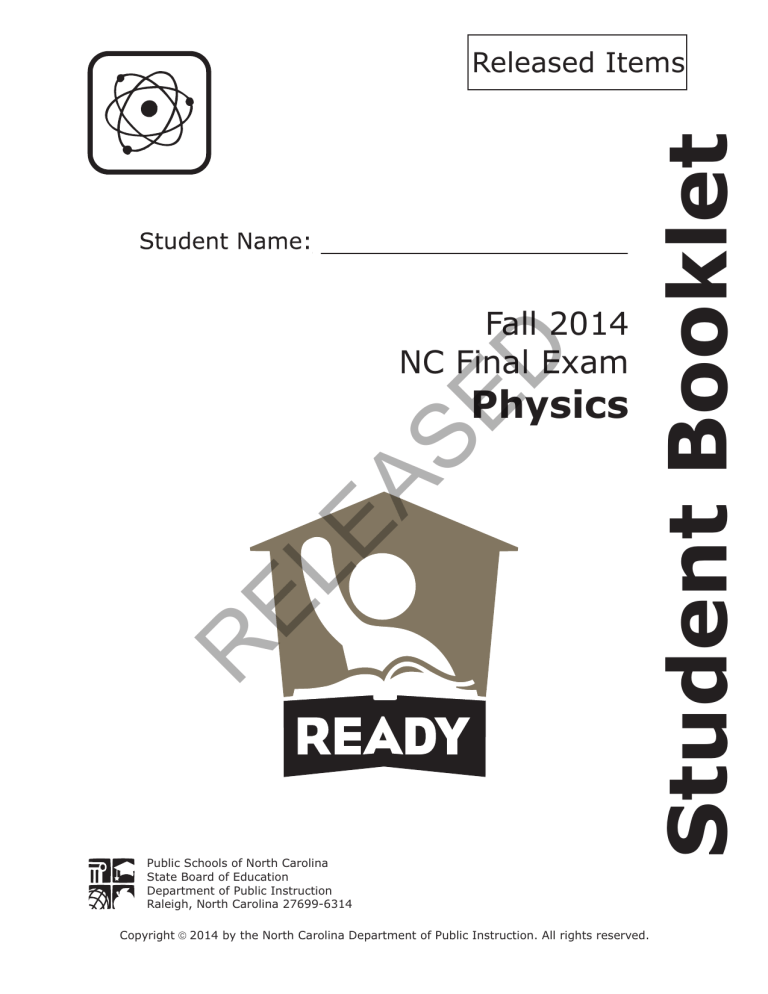
D
Fall 2014
NC Final Exam
R
EL
EA
SE
Physics
Public Schools of North Carolina
State Board of Education
Department of Public Instruction
Raleigh, North Carolina 27699-6314
Copyright ã 2014 by the North Carolina Department of Public Instruction. All rights reserved.
Student Booklet
Released Items
PHYSICS — RELEASED ITEMS
810 N
B
950 N
C
1,800 N
D
2,700 N
D
A 45-kg boy throws a 0.50-kg ball at 15 m/s. Then, a 60-kg boy throws the same
ball at 15 m/s. Which boy generates more momentum?
Neither boy generates any momentum.
B
The 45-kg boy generates more momentum.
C
The 60-kg boy generates more momentum.
D
Both boys generate the same amount of momentum.
SE
A
EA
3
A
A machine pushes a 400.0-N box forward with a horizontal force of 50.0 N for
10.0 s. By how much does the momentum of the box change due to the machine?
(Ignore friction.)
EL
2
A 3,150-kg truck accelerates from 4.2 m/s to 7.8 m/s in 14 s. Which describes the
average force needed for the truck to accelerate under these conditions?
A
4.50 × 103 N • s
B
4.00 × 103 N • s
C
3.50 × 103 N • s
D
5.00 × 102 N • s
R
1
1
Go to the next page.
PHYSICS — RELEASED ITEMS
B
D
Potential Energy (J)
Height (m)
SE
EL
EA
D
Height (m)
Height (m)
R
C
Height (m)
Potential Energy (J)
A
Potential Energy (J)
Which graph represents the relationship between the gravitational potential energy
and the height of an object relative to the ground?
Potential Energy (J)
4
2
Go to the next page.
PHYSICS — RELEASED ITEMS
The potential difference decreases because a 9-V battery cannot handle
resistors in parallel.
B
The potential difference decreases because two resistors in parallel can split
the 9 V equally.
C
The potential difference remains the same because resistors in parallel do
not cause a change in voltage.
D
The potential difference remains the same because resistors in parallel
create extra current that balances the extra resistance.
SE
D
A
EA
Two rocks with masses of 5 kg and 10 kg are dropped from a height of 20 m
above the ground. Just before they reach the ground, which statement is true
about the rocks? (Ignore all friction.)
A
The value for the acceleration of the 5-kg rock is the same as the value for
the 10-kg rock, but the velocity values are different.
B
The values for the acceleration and velocity of the 5-kg rock are the same as
the values for the 10-kg rock.
C
The values for the acceleration and velocity of the 5-kg rock are less than
the values for the 10-kg rock.
D
The values for the acceleration and velocity of the 5-kg rock are greater than
the values for the 10-kg rock.
EL
6
A circuit consists of a single resistor, R1, and a 9-V battery. A second identical
resistor, R2, is added to the circuit in parallel with R1. How does the potential
difference across R1 change after R2 is added?
R
5
3
Go to the next page.
PHYSICS — RELEASED ITEMS
9
Copper contains free electrons, and rubber contains bound electrons.
B
Rubber contains free electrons, and copper contains bound electrons.
C
Copper contains free protons, and rubber contains bound protons.
D
Rubber contains free protons, and copper contains bound protons.
D
A
SE
A positive glass rod is placed near a neutral metallic sphere. If they do not touch,
what happens to the charges inside the sphere?
Like charges attract, which causes the sphere to become polarized.
B
Unlike charges attract, which causes the sphere to become polarized.
C
Like charges attract, which causes the sphere to become charged.
D
Unlike charges attract, which causes the sphere to become charged.
EA
A
EL
8
The atoms of both copper and rubber contain protons and electrons; however,
copper is more conductive than rubber. Why is copper able to conduct more
electricity?
An electron loses 2.00 x 10-15 J of energy traveling to the screen of a laptop
computer. Why is the energy loss small?
A
because the charge is small
B
because the charge is large
C
because the resistance is small
D
because the resistance is large
R
7
4
Go to the next page.
PHYSICS — RELEASED ITEMS
How does a large number of turns in an electromagnet create a strong magnetic
field?
A
Each turn increases the amount of time it takes for the current to travel
through the wire.
B
Each turn decreases the amount of time it takes for the current to travel
through the wire.
C
Each turn increases the amount of induction produced by the current in the
wire.
D
Each turn decreases the amount of induction produced by the current in the
wire.
aligning the coils perpendicular to each other
B
aligning the coils parallel to each other
C
using only aluminum wiring
D
using only copper wiring
EA
A
EL
12
Two current-carrying solenoids are placed near each other. Which would increase
the amount of mutual inductance the pair of coils experiences?
An object is in uniform, circular motion and is moving at a speed of 2.3 m/s. How
does the speed of the object change if the centripetal force and the radius remain
constant and the mass of the object quadruples?
R
11
SE
D
10
A
Its speed is cut in half, because centripetal force is based on the square root
of velocity.
B
Its speed is cut in half, because centripetal force is based on velocity
squared.
C
Its speed doubles, because centripetal force is based on the square root of
velocity.
D
Its speed doubles, because centripetal force is based on velocity squared.
5
Go to the next page.
PHYSICS — RELEASED ITEMS
This is the end of the Physics Released Items.
Directions:
1. Look back over your answers for the test questions.
2. Make sure all your answers are entered on the answer sheet. Only what is
entered on your answer sheet will be scored.
3. Put all of your papers inside your test book and close the test book.
D
4. Place your calculator on top of the test book.
SE
5. Stay quietly in your seat until your teacher tells you that testing is
finished.
R
EL
EA
6. Remember, teachers are not allowed to discuss items from the test with
you, and you are not allowed to discuss with others any of the test
questions or information contained within the test.
6
PHYSICS — RELEASED ITEMS
Physics
RELEASED Items1
Fall 2014
Answer Key
Type2
Key
Percent Correct3
Standard
1
MC
A
78%
Phy.1.2.1
2
MC
D
66%
Phy.1.3.2
3
MC
D
50%
Phy.1.3.2
4
MC
D
66%
5
MC
C
6
MC
B
7
MC
8
MC
11
12
SE
Phy.2.3.1
56%
Phy.1.1.1
EA
55%
A
79%
Phy.3.1.1
B
51%
Phy.3.1.4
EL
10
Phy.2.1.1
MC
A
30%
Phy.3.1.5
MC
C
65%
Phy.3.2.2
MC
B
48%
Phy.3.2.3
MC
B
56%
Phy.1.2.5
R
9
D
Item Number
1
PHYSICS — RELEASED ITEMS
1
These released items were administered to students during a previous test administration. This
sample set of released items may not reflect the breadth of the standards assessed and/or the
range of item difficulty found on the NC Final Exam. Additional items may be reviewed at
http://www.ncpublicschools.org/accountability/common-exams/released-forms/. Additional
information about the NC Final Exam is available in the Assessment Specification for each exam
located at http://www.ncpublicschools.org/accountability/common-exams/specifications/.
2
This NC Final Exam contains only multiple-choice (MC) items.
3
R
EL
EA
SE
D
Percent correct is the percentage of students who answered the item correctly during the
Spring 2014 administration.
2
PHYSICS — RELEASED ITEMS
Standard Descriptions
Only clarifying objective descriptions addressed by the released items in this booklet are listed
below. A complete list of the North Carolina Essential Standards for Science and Social studies
may be reviewed at http://www.ncpublicschools.org/acre/standards/new-standards/.
Phy.1.1.1 (Forces and Motion)
Analyze motion graphically and numerically using vectors, graphs and calculations.
D
Phy.1.2.1 (Forces and Motion)
Analyze forces and systems of forces graphically and numerically using vectors, graphs and
calculations.
Phy.1.2.5 (Forces and Motion)
Analyze basic forces related to rotation in a circular path (centripetal force).
SE
Phy.1.3.2 (Forces and Motion)
Analyze the motion of objects based on the relationship between momentum and impulse.
Phy.2.1.1 (Energy: Conservation and Transfer)
Interpret data on work and energy presented graphically and numerically.
EA
Phy.2.3.1(Energy: Conservation and Transfer)
Explain Ohm’s law in relation to electric circuits.
Phy.3.1.1 (Interactions of Energy and Matter)
Explain qualitatively the fundamental properties of the interactions of charged objects.
EL
Phy.3.1.4 (Interactions of Energy and Matter)
Explain the mechanisms for producing electrostatic charges, including charging by friction,
conduction, and induction.
R
Phy.3.1.5 (Interactions of Energy and Matter)
Explain how differences in electrostatic potentials relate to the potential energy of charged
objects.
Phy.3.2.2 (Interactions of Energy and Matter)
Explain how electric currents produce various magnetic fields.
Phy.3.2.3 (Interactions of Energy and Matter)
Explain how transformers and power distributions are applications of electromagnetism.
3


